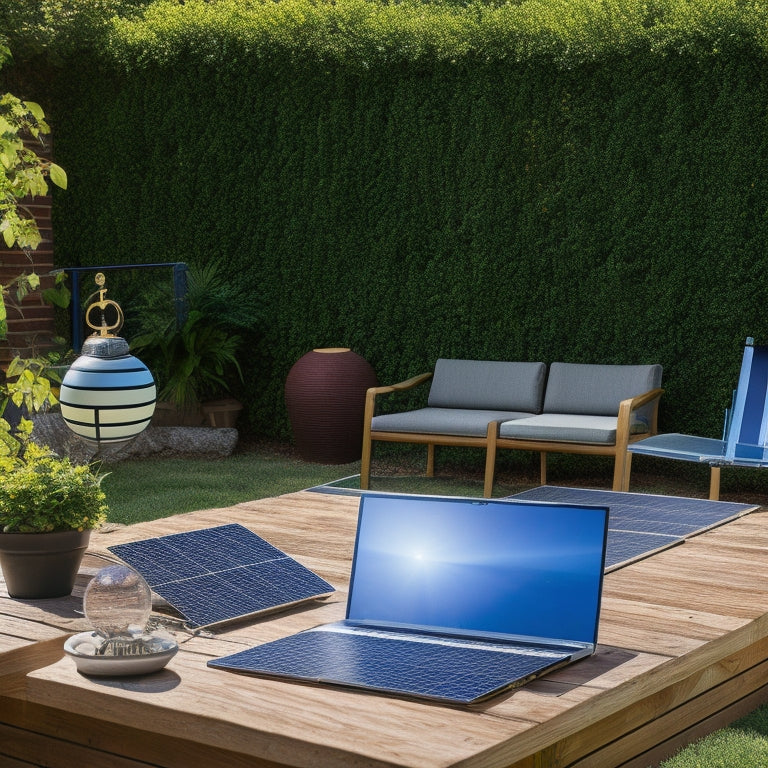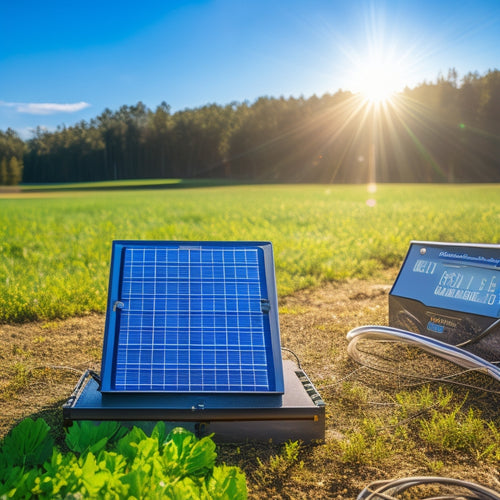
10 Essential Tips for Ordering Solar Panels Online
Share
When ordering solar panels online, you'll want to research retailers thoroughly, scrutinizing reviews and evaluating transparency. Accurately assess your energy requirements with an energy audit and load calculation. Choose the right panel type based on your needs and budget, considering efficiency, durability, and certifications. Verify compatibility with inverters and understand shipping and installation logistics. Review return and refund policies, and set a baseline price to avoid misleading discounts. By following these essential tips, you'll be well on your way to a successful online purchase - and there's even more to discover as you move forward with your solar panel investment.
Key Takeaways
• Research online solar panel retailers thoroughly, scrutinizing reviews, transparency, and product information to ensure a reliable purchase.
• Accurately assess your energy requirements through an energy audit, load calculation, and analysis of past consumption patterns.
• Select the right solar panel type based on your energy needs and budget, considering efficiency, cost, and durability.
• Verify certifications, warranties, and return policies to ensure a secure investment and hassle-free returns.
• Ensure compatibility between solar panels and inverters, considering power output, certifications, and compliance standards for seamless integration.
Researching Online Solar Panel Retailers
When shopping for solar panels online, you need to thoroughly research online retailers to make sure you're buying from a reputable dealer that can provide quality products and reliable customer service. A vital step in this process is to scrutinize online reviews from multiple sources, including independent review platforms and social media. Look for consistency in the ratings and pay attention to the comments, both positive and negative. This will give you a thorough understanding of the retailer's strengths and weaknesses.
It's also essential to evaluate the retailer's transparency. Check if they clearly display their product specifications, warranty information, and return policies. Be wary of retailers that lack transparency or seem evasive about their products or services. A reputable retailer will be open and honest about their offerings, and their website should reflect this.
Understanding Your Energy Requirements
Before ordering solar panels online, you must accurately assess your energy requirements to make certain you're purchasing a system that meets your specific needs. This vital step ensures you don't end up with a system that's either too small or too large for your energy demands.
To get it right, you'll need to conduct an energy audit, which involves analyzing your past energy consumption patterns. This will help you identify areas of inefficiency and opportunities for improvement.
Next, perform a load calculation to determine the total amount of energy your solar panel system needs to produce. This calculation takes into account factors like your energy usage, roof size, and local building codes.
Choosing the Right Solar Panel Type
With multiple solar panel types available, you need to select the one that best suits your energy requirements and budget, and understanding the differences between monocrystalline, polycrystalline, and thin-film solar panels is essential to making an informed decision.
Here's a comparison of the three main types of solar panels:
| Panel Type | Efficiency | Cost |
|---|---|---|
| Monocrystalline | High (15-20%) | High |
| Polycrystalline | Medium (12-15%) | Medium |
| Thin-Film | Low (7-14%) | Low |
Monocrystalline panels offer high efficiency and Bifacial advantages, making them a popular choice. However, they come at a higher cost. Polycrystalline panels are a more affordable option with moderate efficiency, while thin-film panels are the most budget-friendly but have lower efficiency. When choosing a solar panel type, consider your energy needs, budget, and available space. Monocrystalline benefits, such as high efficiency and durability, may outweigh the higher cost for those with high energy demands. Weigh your options carefully to make an informed decision.
Considering Efficiency and Durability
You'll want to scrutinize the efficiency and durability of your chosen solar panel type, as these factors greatly impact the system's overall performance and lifespan.
Panel quality directly affects energy output, so it's important to select a high-efficiency panel that can maximize energy production. Look for panels with a high power output per unit area, usually measured in watts per square meter (W/m²). A higher power output means more energy generated per hour of sunlight.
When evaluating durability, consider the panel's build quality, materials, and construction. A durable panel can withstand harsh weather conditions and maintain its performance over time. Check the manufacturer's ratings for temperature coefficient, which indicates how well the panel performs in high temperatures. A lower temperature coefficient means the panel will maintain its energy output even in hot conditions.
Checking Certifications and Warranties
When you're ordering solar panels online, it's essential that you check the certifications and warranties offered by the manufacturer.
You should look for certifications from reputable organizations, such as UL (Underwriters Laboratories) or IEC (International Electrotechnical Commission), which guarantee the panels meet certain safety and performance standards.
Certification Types Matter
Your solar panel purchase is only as important as the certifications backing it, so make sure to carefully review the credentials of any potential supplier. Certification types matter, and it's vital to understand the differences between them.
Look for certifications from reputable third-party organizations, such as UL (Underwriters Laboratories) compliance, which guarantees the product meets industry standards for safety and performance. Industry standards, such as those set by the International Electrotechnical Commission (IEC), provide a benchmark for manufacturers to follow.
When evaluating certifications, check for specific standards, such as IEC 61215, which covers crystalline silicon terrestrial photovoltaic (PV) modules. Be wary of suppliers with incomplete or outdated certifications, as this can indicate a lack of commitment to quality and safety.
Manufacturer Warranty Details
As you confirm the certifications of your potential solar panel supplier, it's equally important to scrutinize the manufacturer's warranty details to make sure you're protected against defects and performance issues.
A thorough warranty provides assurance that the manufacturer stands behind their product's quality and performance. When reviewing the warranty details, pay attention to the warranty period, which can range from 10 to 30 years or more, depending on the manufacturer. A longer warranty period generally indicates a higher level of confidence in the product's quality.
Additionally, consider the warranty transfer process, which allows you to transfer the warranty to a new owner if you sell your property. This can greatly enhance your property's value.
Be sure to understand the terms and conditions of the warranty, including what's covered, the process for filing claims, and any maintenance requirements to keep the warranty valid.
Third-Party Validation Needed
Certification from reputable third-party organizations is essential in verifying the quality and reliability of your chosen solar panels, giving you an added layer of assurance that the manufacturer's claims are backed by unbiased experts.
When you're ordering solar panels online, it's important to look for industry-recognized certifications that guarantee the products meet specific standards. For instance, look for certifications from organizations like UL (Underwriters Laboratories) or IEC (International Electrotechnical Commission). These certifications guarantee that the solar panels have met rigorous testing and quality control standards.
Government endorsements are also an essential aspect to take into account. Check if the manufacturer has received any government-backed certifications or recognition. For example, the U.S. Department of Energy's Solar Energy Technologies Office provides funding and support for solar energy projects that meet specific standards.
When a manufacturer has received such endorsements, it's a strong indication that their products meet high-quality standards. By verifying these certifications and endorsements, you'll have peace of mind knowing that your solar panels are reliable, efficient, and built to last.
Comparing Prices and Discounts
When shopping for solar panels online, you'll encounter a multitude of options, each with varying price tags, making it important to compare prices and discounts offered by different manufacturers and retailers. This is essential to make sure you're getting the best deal for your investment.
To effectively compare prices, consider the following strategies:
-
Establish price benchmarks: Research and set a baseline price for the solar panels you're interested in, based on industry standards and competitor pricing.
-
Analyze discount strategies: Look for discounts, promotions, and special offers that can bring the cost down. Be wary of misleading or fake discounts, and always check the fine print.
-
Calculate the total cost of ownership: Factor in not only the upfront cost but also the long-term expenses, such as maintenance, warranty, and potential repairs.
Reading Customer Reviews and Ratings
When reading customer reviews and ratings, you'll want to analyze the ratings breakdown to get a sense of the overall satisfaction level.
You should also verify the authenticity of testimonials to confirm they're from real customers and not fake accounts.
Ratings Breakdown Analysis
Your thorough ratings breakdown analysis should involve scrutinizing the overall rating distribution, as a skewed rating curve can indicate inconsistencies in the reviewer's experience. A closer look at the ratings distribution can reveal valuable insights into the product's performance.
To get a better understanding of the product's reliability, you should:
-
Identify the peak rating: Is it skewed towards 5-star reviews or are there more 1-star reviews? This can indicate if the product is consistently meeting customer expectations.
-
Analyze the rating frequency: Are there more reviews clustered around a specific rating, such as 3-star or 4-star reviews? This can indicate if there are specific issues with the product.
-
Look for review trends: Are there any patterns or trends in the reviews, such as complaints about a specific feature or praise for a particular aspect of the product?
Authenticity of Testimonials
As you explore customer reviews and ratings, it's important to confirm the authenticity of testimonials to guarantee they reflect genuine user experiences rather than manipulated or fake feedback. Fake reviews and review manipulation are common issues that can mislead you into making an ill-informed purchasing decision.
To avoid falling prey to such tactics, look for reviews with:
| Red Flag | Description | Action |
|---|---|---|
| Overly positive language | Reviews that use overly positive language, such as 'Best solar panels ever!' | Be cautious, as they may be fake |
| Unnatural patterns | Reviews that follow an unnatural pattern, such as a sudden influx of 5-star reviews | Investigate further to confirm authenticity |
| Lack of specific details | Reviews that lack specific details about the product or service | May indicate fake or manipulated reviews |
| Overemphasis on price | Reviews that focus excessively on price rather than product performance | May be a red flag for fake reviews |
Ensuring Compatibility With Inverters
You need to make sure that the solar panels you order online are compatible with your existing inverter or the one you plan to purchase. This is important because incompatible solar panels can lead to reduced energy output, system failure, or even damage to your equipment.
When selecting solar panels, consider the following inverter compatibility factors:
-
Inverter type: Make sure the solar panels are compatible with your inverter type, such as string inverters, microinverters, or power optimizers.
-
Power outputs: Verify that the solar panel's maximum power output matches the inverter's input capacity to avoid overloading or underutilization.
-
Certifications and compliance: Check if the solar panels and inverter meet the same certifications and compliance standards, such as UL or IEC, to ensure seamless integration.
Understanding Shipping and Installation
Once you've confirmed compatibility with your inverter, it's time to contemplate the logistics of getting your solar panels from the online retailer to your installation site. This is where you'll encounter logistical challenges that can impact the success of your solar panel installation.
You'll need to take into account the shipping method, delivery timeline, and installation complexity. Will the retailer provide tracking information, and what's the estimated delivery time? Are there any specific requirements for receiving and inspecting the shipment?
When it comes to installation, you'll need to take into consideration the complexity of the process. Will you be hiring a professional installer, or attempting a DIY installation? If you're going the DIY route, make sure you have the necessary skills and equipment.
Installation complexity can vary greatly depending on the type of solar panels, roof type, and local building codes. Be sure to factor in any additional costs or permits required for installation. By understanding the logistical challenges and installation complexity, you can ensure a smooth and successful solar panel installation.
Reviewing Return and Refund Policies
Before finalizing your online solar panel purchase, carefully review the retailer's return and refund policies to guarantee you're protected in case the products don't meet your expectations. You want to make certain you can easily return or exchange items that don't fit your needs, and get a timely refund if needed.
Here are key aspects to examine in the return and refund policies:
-
Policy Flexibility: Can you return or exchange items without hassle? Are there any restocking fees or penalties?
-
Return Timeline: How long do you have to initiate a return or exchange? Are there specific deadlines or timeframes?
-
Refund Process: How will refunds be processed, and what's the estimated timeframe for receiving your refund?
Frequently Asked Questions
Can I Install Solar Panels on a Rental Property?
Before installing solar panels on a rental property, you'll need to review your Rental Agreements and obtain Landlord Permissions to guarantee compliance and avoid potential disputes or penalties.
Are Solar Panels Compatible With Smart Home Systems?
"As you seek seamless smart home synergy, rest assured solar panels can harmonize with your smart system, enabling Smart Integration and Energy Automation, allowing you to effortlessly monitor and manage your eco-friendly energy ecosystem."
Do Solar Panels Work During a Power Outage?
During a power outage, your solar panels won't provide electricity unless you have a backup system, allowing you to achieve grid independence; with the right setup, you'll have uninterrupted power, even when the grid fails.
Can I Add More Solar Panels to My Existing System?
'Ah, you want to supercharge your existing system, huh? You're in luck! Yes, you can add more solar panels, aka system expansion, and even upgrade your panels for more efficiency - just verify compatibility and consult a pro.'
Do Solar Panels Void My Roof's Warranty?
When you install solar panels, you won't automatically void your roof's warranty. However, you'll need a roof inspection to verify compatibility. If issues arise, warranty transfer or adjustments might be necessary to maintain validity.
Related Posts
-

Solid State Batteries in Electric Vehicles
Solid-state batteries revolutionize electric vehicles by offering a longer lifespan and higher energy density than tr...
-

Designing a Green Roof for Maximum Energy Efficiency
Designing a green roof for maximum energy efficiency involves several key strategies. Start by selecting native, drou...
-

Choosing the Right Solar Power Charge Controller
Choosing the right solar power charge controller is crucial for maximizing energy efficiency and extending battery li...


